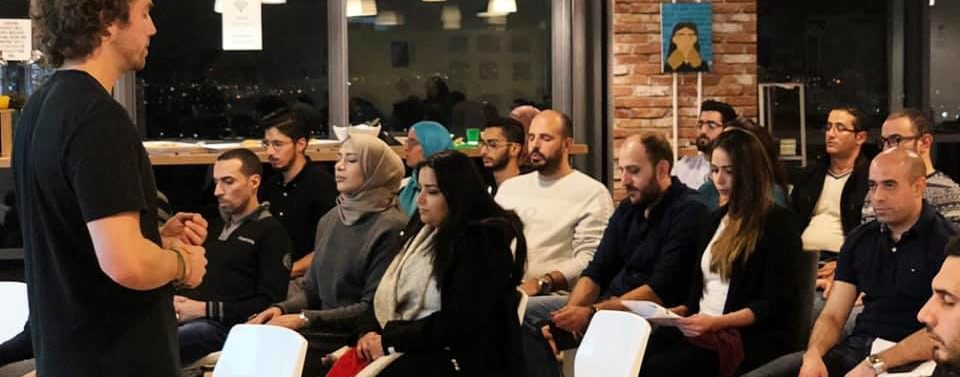Flow hosted an event in cooperation with Sharp & Beyond for Legal and Investment Consulting Services. The workshop provided an overview on companies’ registration in Palestine and the United States, the role of the Palestinian Investment Promotion Agency, and tax filing for companies.
Flow signed a Memorandum of Understanding with the Higher Council of Innovation & Excellence to support startups and to help bridge the gap between them and investors.
Flow has signed a promotional partnership agreement with the ANIMA Investment Network in their project ‘The Next Society’. The project is an open community of changemakers engaged in innovation and economic development.
Through a series of experiential activities, reflection exercises and discussions given by Connor Swenson and other members from Google for Startups, 80 Palestinian entrepreneurs were enlightened on how to boost their productivity and get things done at a faster pace. Topics discussed included productivity, time management, personal leadership, planning and how to think big.
In a 2-hour event, Flow connected their 7 selected startups and others in the Palestinian ecosystem with entrepreneurs at Google for Startups who came from campuses in Brazil, Spain, Poland, United Kingdom, United States of America and South Korea. Mentoring focused mainly on fundraising, partnerships, strategy, marketing, scalability and team management.
Within the Global Entrepreneurship Week (GEW) and in partnership with Gaza Sky Geeks, Flow hosted its first public event which opened the opportunity for a 100 entrepreneurs and other interested parties to network with leading entrepreneurs in the market and exchange experiences. Before the mingling started, Co-founders of Packagecloud, Armando Canals & Joe Damato discussed “Building a company without investors” offering advice and reflection; while, Co-founder of PinchPoint and COO of SocialDice, Khalid Abul Kheir spoke on “Fund Raising & Growth Hacking”.
After an intensive and thorough coaching week, shortlisted teams were asked to pitch their ideas in front of a judging panel that consisted of successful entrepreneurs, venture capitalists, angel investors, and technical experts. Each team was given a 20-minute time slot to pitch their idea, answer questions and concerns, and receive constructive feedback. Judges’ evaluation and scoring of the pitches were reviewed thoroughly by Flow and upon that teams were selected for the next phase of the program.
Flow arranged an intensive boot camp that aimed to prepare shortlisted teams for a successful pitch. Sessions were given by both local and international mentors & experts based on a curriculum that mainly included business concepts and practices, entrepreneurial competencies, pitching skills and the sharing of first hand experiences derived directly from the field. The week that started on Sempteber 1st ended on the 6th with a ‘Demo Day’ that helped teams master their skills before pitching their ideas in front of a judging panel.
Stepping into the offices of the few technology startups in Ramallah really feels like entering a work space in San Francisco or Silicon Valley.
The walls of every room are built of glass and long group tables that accomodate 20 employees at a time give an open and cooperative atmosphere. Park benches and patches of astroturf give at least a partial feel of being outdoors.
The tech industry is making innovative strides in Palestine. Yet unlike Silicon Valley, Palestinian startups face both unique challenges and opportunities.
Since 2011, tech startups – or at least the prospect of them –
